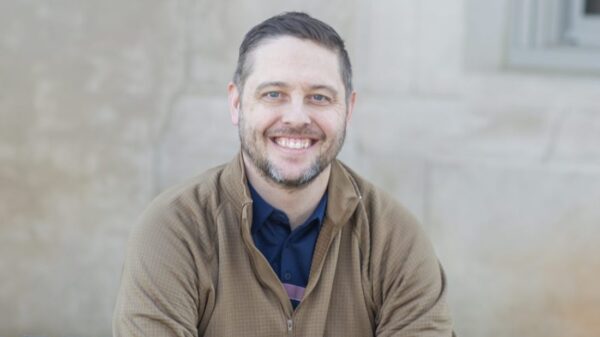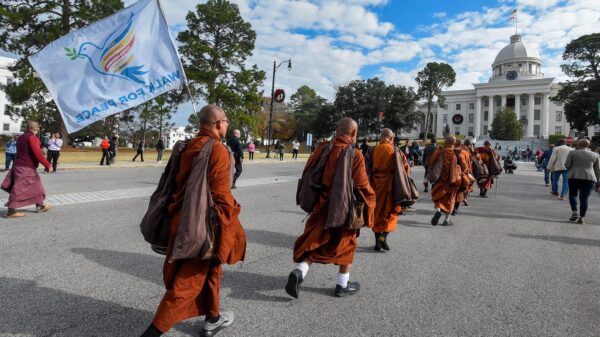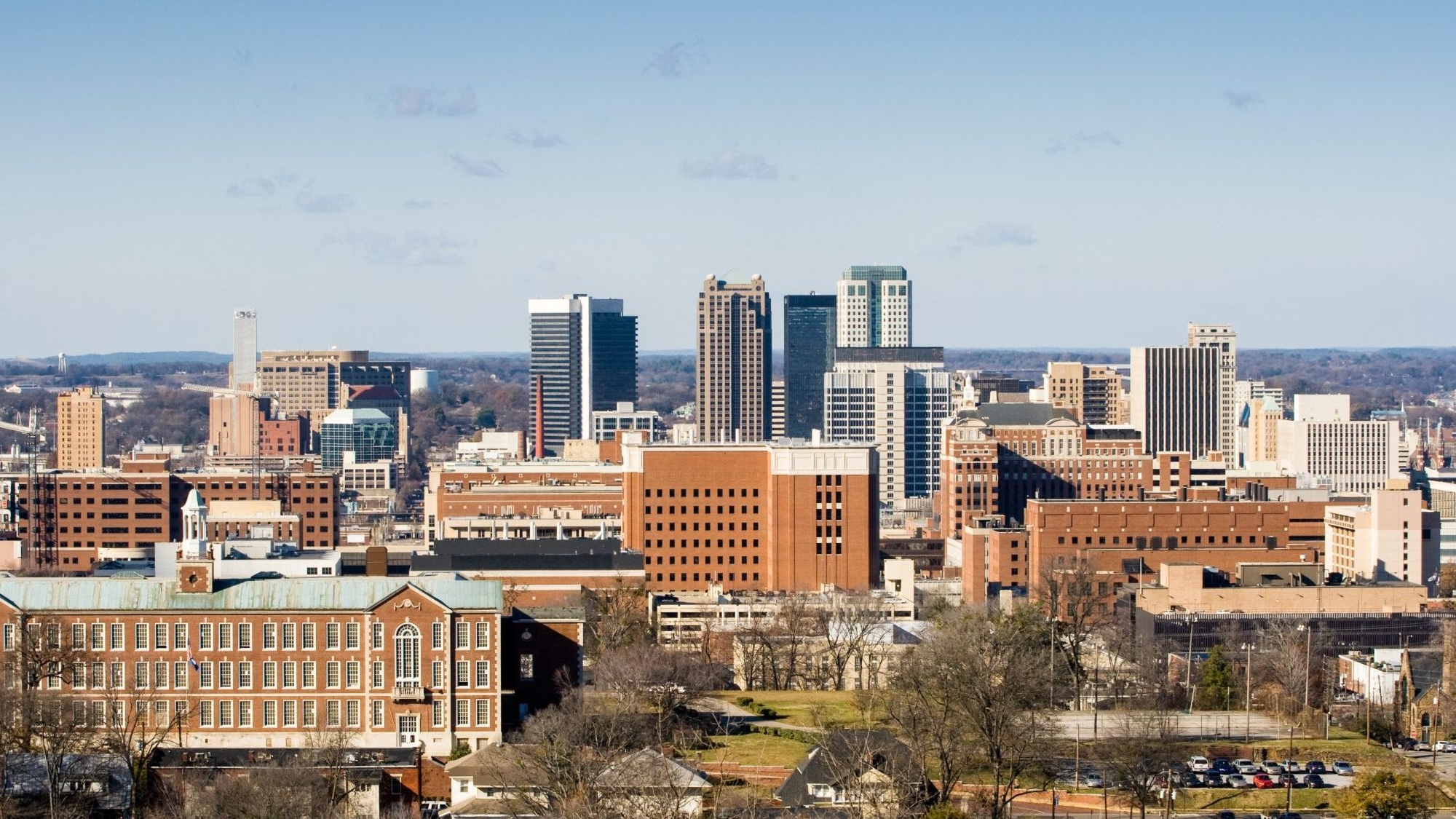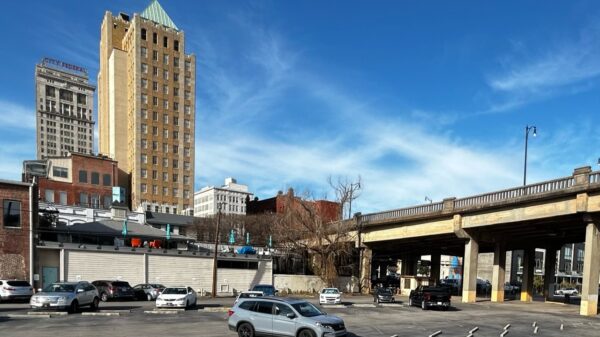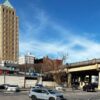Most Alabama cities have few, if any, protections for LGBTQ individuals. Birmingham, the only city in the state with any rigorous protections for LGBTQ people, recently scored a 100 on the Human Rights Campaign’s Municipal Equality Index.
But even there, LGBTQ children and teens are not protected from so-called “conversion therapy,” a debunked practice that has been refuted by all reputable psychology associations. Those that purport to practice conversion therapy claim they can change a person’s sexual orientation or gender identity, often through psychological or religious interventions.
It’s still legal in the state of Alabama and in Birmingham, where a group of activists is urging newly elected Mayor Randall Woodfin and the City Council to ban the practice.
The Affirming Birmingham Coalition, which includes more than 20 local faith and community leaders, wrote Woodfin on Oct. 1 asking for a meeting to discuss finding a way to end the practice in the city.
Among the signatories on the letter are more than a dozen Birmingham churches including the Highlands United Methodist Church, the Pilgrim United Church of Christ, Woodlawn United Methodist Church, Edgewood Presbyterian Church and First Presbyterian Church Birmingham.
Jordan Kramer, a student at Auburn University, organized the coalition. When he was a teen, even though he never lived in Birmingham, he spent 14 months of his life traveling to and from the city for conversion therapy.
“My junior and senior year of high school, I would drive up or be driven up to Birmingham for conversion therapy,” Kramer said. “It had lasting effects on my life, and I’ve been grateful for all of the support I’ve received since then. That’s why I picked Birmingham.”
Kramer said he is starting in Birmingham because of his own lived experience, and because stomping out the practice in the state’s biggest city could save other children from having to endure the experience he did even if they don’t live in the city. Kramer, for example, lived in Prattville, Alabama, when he was subjected to the practice.
“It would really protect youth across the state because many do travel to Birmingham for those services,” Kramer said. “I would love to see it start in Birmingham. It would send a strong signal to LGBTQ youth here in the South that governments, and the coalition, are there in their corner.”
If it were to ban conversion therapy, Birmingham would be the first city in the Deep South stop the practice.
The Municipal Equality Index, which gave Birmingham a perfect score, is the only nationwide rating system for LGBTQ inclusion in municipal law and policy. Birmingham is the first city in the Deep South to achieve a perfect score, buoyed by its recent decision to pass an LGBTQ-inclusive non-discrimination housing ordinance.
And even though Birmingham scored high, other cities fell far below the national average. Tuscaloosa, which had the second highest score after the Magic City, was rated only a 30 out of 100. Huntsville and Mobile scored 19 out of 100, and Auburn came in last at four out of 100, up from zero two years ago when the city was first scored.
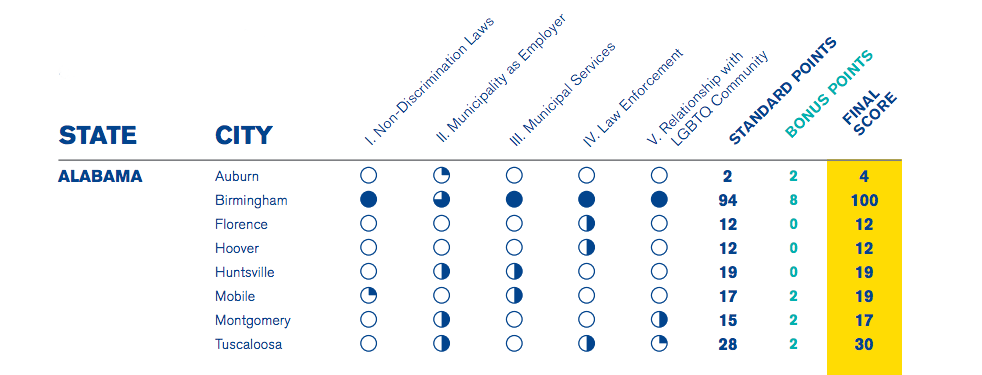
“Forward-looking leaders across the U.S. are stepping up, protecting their youth from so-called ‘conversion therapy,’ increasing anti-bullying protections, ensuring transgender city employees have access to inclusive health care benefits and protecting LGBTQ people from discrimination in all areas of life,” HRC President Chad Griffin said.
The average score for cities in Alabama was a 27, but the median score was only 18 out of 100.
The members of the coalition say Birmingham should go further and take action against conversion therapy because studies, like one from San Francisco State University, have found that LGBTQ who are reared in unsupportive environments — like those who are forced to go to conversion therapy — are eight times more likely to attempt suicide than those who are raised in supportive environments.
The American Psychological Association, the World Health Organization, the National Association of Social Workers, the American Counseling Association and other major groups have derided the practice for its ineffectiveness and its negative side effects.
Fourteen states and 43 municipalities have passed legislation banning mental health professions from practicing conversion therapy on minors.
“Conversion therapy is a barbaric practice that tries to force people to be somebody they’re not, and we see higher levels of mental illness associated with it,” said Neil Rafferty, a former marine and candidate for Alabama House in District 54.
If elected, Rafferty, who is openly gay, would replace former State Rep. Patricia Todd, Alabama’s first openly gay state lawmaker. Todd announced earlier this year that she would not seek re-election after three terms in Montgomery.
“It’s not curative. It doesn’t do anything. It’s harmful,” Rafferty said. “It’s very simple, cut-and-dry for me. There’s not even a question.”
Rafferty said he was hopeful that Woodfin will agree to the meeting. And if the coalition can get the practice banned in Birmingham, Rafferty said it would be good for the state’s children if the Legislature would consider a law in Montgomery to ban the practice statewide.
“Anything that would be harming children as opposed to helping them and nurturing them and making them more productive is what we should be aiming for,” Rafferty said. “If it is a widespread practice, then I would absolutely look into that.”

